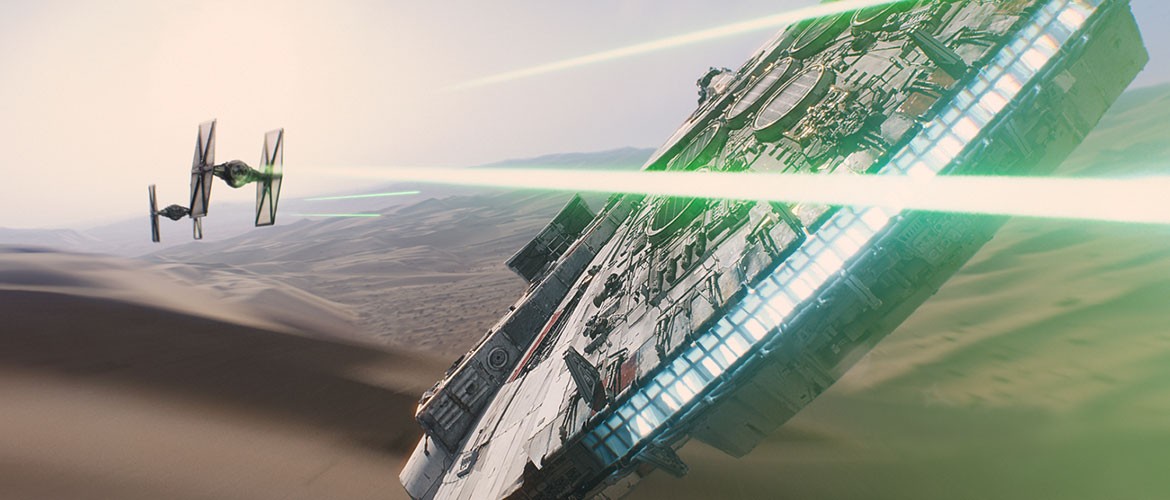A Episode VII lands in cinemas, Miles Salter suggests Star Wars has narrowed Hollywood’s horizons
Sometime around 1977 or 1978, an episode of Screen Test, the BBC’s film programme, featured a clip from a sci-fi movie. Three men and one furry looking thing were in the cockpit of a spaceship, heading towards a small moon.
The clip was impressive, and unlike anything I’d seen before, although at the age of six, my critical faculties were hardly overdeveloped.
When I also saw the film featured at an exhibition at London’s Science Museum, I was similarly impressed. I fell in love with Star Wars over the next few years, especially the first one.
At one point I had a Star Wars sleeping bag… which I’ve still got. Like thousands of other kids, I was totally hooked.
There was nothing more exciting than the adventures of Luke Skywalker, and that fantastic fanfare music.
Star Wars was like nothing else that had come before it. Big, bold, and exciting, it was like LSD for childhood, offering a vision of a galaxy that seemed fully formed and totally real.
Fairy tale in space
George Lucas’ space fantasy was enormously successful, and has since become something of an emblem of western culture. Lucas took classic storytelling ideas from his mentor Joseph Campbell (author of Hero With A Thousand Faces) and repackaged them in the realm of space fantasy.
The princess in the tower, from fairy tales and folklore, was locked instead in a space station. The older, wiser guide became a laser-wielding monk in the shape of Ben Kenobi.
George Lucas was also paying homage to classic Hollywood. A key influence on Star Wars was the 1930s Flash Gordon series.
Lucas borrowed the scrolling text idea at the start of Flash Gordon and freshened it up… And the frequent ‘cliff hanger’ elements to Star Wars (Luke being attacked by Sand People, the Trash Compactor’s walls closing on the heroes, etc) were also borrowed from Flash Gordon.

Other influences included 633 Squadron, The Searchers and more.
The result was stellar success: the Star Wars franchise remains one of the biggest blockbuster series in Hollywood history.
The films have left an indelible mark on Hollywood, and not everybody thinks their legacy is a positive one.
Marketing and bad dialogue
Alongside Steven Spielberg’s Jaws, Star Wars ushered in a new era for Hollywood, the era of blockbuster movies making lots of money and being marketed by a slick advertising machine.
Most people don’t want ambiguity or realism – they just want escapism
(They’re also much darker than Star Wars, which, even at its most sinister, never gets really upsetting.
It’s an easy, fun watch. Who wants ambiguity when you can have an explosion?)It’s hard to see the ambiguity in Darth Vader’s black outfit. Nor was the dialogue up to much.
“You can write this shit, George, but don’t expect us to say it,” Harrison Ford said to George Lucas at one point.
More recently, Ford pointed out that the Star Wars characters were one dimensional, saying Han Solo wasn’t a very interesting character to play.

These days, movies are all about spectacle on a vast scale. Disaster movies, movies with super heroes in, movies with elves and orcs: arguably, they’ve all come in the wake of Star Wars.
But it hasn’t made Hollywood a more interesting place, it’s narrowed it down. You can have any film you like as long as it’s got a really bad bad guy, a really good god guy, and some massive bangs.
Most people don’t want ambiguity or realism – they just want escapism, and Star Wars provides that.
I’m looking forward to Episode VII: The Force Awakens, and have loved watching the trailers on the web. It’ll be a blast to see Han Solo and Chewbacca again.
But I don’t think Star Wars is the last word in cinema. It’s great fun, exhilarating, and entertaining. But it hasn’t been universally great for the world of film.
